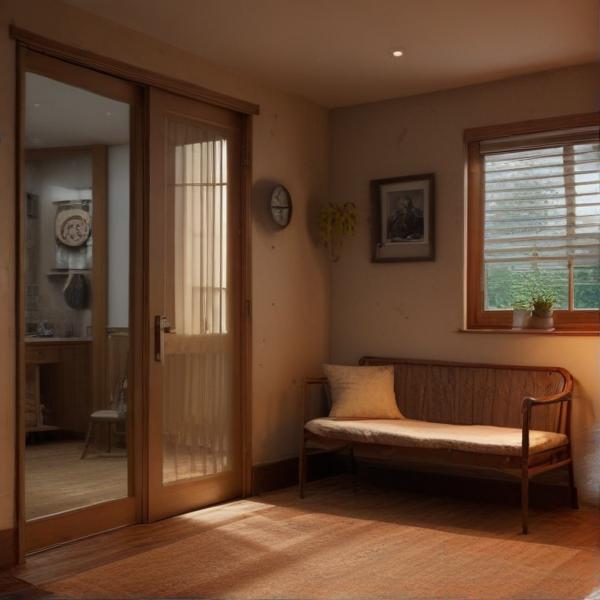基本信息 (Basic Information)
含义与用法 (Meanings & Usage)
中文核心释义 (Core Chinese Meaning): 住宅,住所,人居住的房屋
英文核心释义 (Core English Meaning): house, residence, dwelling
象形意义 / 为何这么写 (Pictographic Meaning / Writing Rationale)
文言文释义 (Classical Chinese Meaning)
与现代意义相近,古文中“宅”主要指房屋、居所,也用于比喻安身立命之地。Similar to modern meaning; in classical texts, '宅' mainly refers to a house or residence, and can also metaphorically mean one's place of living or standing.
深入学习 (In-depth Study)
字源故事 (Origin Story)
字形演变 (Character Evolution)
常用词语和例句 (Common Words & Examples)
住宅 (residence, housing)
这片小区的住宅宽敞明亮。
Eng: The residences in this neighborhood are spacious and bright.
宅男 (homebody man, geek (male who prefers to stay at home))
哥哥是个宅男,周末都喜欢待在家里玩电脑。
Eng: My older brother is a homebody; he likes to stay at home and play computer games on weekends.
宅女 (homebody girl, (female who prefers to stay at home))
她自称是个宅女,很少外出。
Eng: She calls herself a homebody and rarely goes out.
相关成语 (Related Idioms)
相关成语信息待补充。Related idiom information pending.
多语言翻译 (核心释义) (Translations (Core Meaning))
- French: maison, demeure
- German: Haus, Wohnung
- Spanish: casa, residencia
- Italian: casa, abitazione
- Portuguese: casa, residência
- Russian: дом, жилище
- Arabic: منزل، إقامة
- Persian: خانه، محل سکونت
- Dutch: huis, woning
- Polish: dom, mieszkanie
- Vietnamese: nhà ở, nơi cư trú
- Ukrainian: дім, житло
视频学习资源 (Video Learning Resources)
通过以下链接在热门视频网站搜索 "宅" 的更多讲解:
Search for more explanations of "宅" on popular video sites:
- 在 Bilibili.com 搜索 "宅 字源 说文解字" (Search on Bilibili)
- 在 YouTube.com 搜索 "zhai character origin etymology" (Search on YouTube)
网络参考 (Web References for "宅") ()
网络内容摘要 (Web Content Summary):
核心含义与起源:“宅”主要指适于居住的房屋或住所。其甲骨文形式中,上部“宀”(宝盖)表示屋顶,下部类似“勘测工具”或“乇”,表达寄托、安放的意思,体现了“宅”是人们居住、安身之处,对地理与环境有讲究。 Core meaning & origin: The character “宅” primarily means a dwelling or residence suitable for living. Its ancient form shows a roof (宀) above symbols resembling a survey tool or representing support (乇), highlighting the idea of a place where people settle or live, often with concerns for location and environment (feng shui).
- 文化背景: “宅”在中国文化中经常和安居、风水等理念有关,代表住所应选择合适地理环境。 Cultural Background: “宅” is associated with concepts of peaceful living and feng shui in Chinese culture, meaning a home should have an ideal location.
- 常用词汇与用法: 常见词如“住宅(residence)”、“宅男/宅女”(homebody, people who prefer to stay at home)。网络语境下,“宅”常指喜欢在家的人。 Common words & usage: Examples include “住宅” (residence) and “宅男/宅女” (homebody, i.e., people who prefer staying at home), especially in internet slang.
- 易混淆点: “宅”与“家”(home, family)不同;“宅”重在物理住所,“家”侧重家庭、成员与归属感。 Common confusion: “宅” refers to the physical dwelling, while “家” emphasizes the concept of home, family, and belonging.
成语: 与“宅”相关的成语有“安宅正路”(寓意安居乐业,走正道)。 Idiom: For example, “安宅正路” expresses the idea of living peacefully and acting rightly.
汉字"宅"的起源、演变过程-汉字字源辞典
汉字字源辞典收录7747条汉字词条,基本涵盖了常见汉字的字源解析,是汉字研究的必备工具。 ... 个人认为:甲骨文"宅"字宝盖里面的符号像是勘测位置或堪舆用的工具,"宅"应该是适于居住的建筑,所以对于地理位置和环境风水都有要求。 ...
宅字形演变字源_汉字「宅」_宅的甲骨文_宅的金文_金文编_甲骨文编
宅字形演变字源,汉字「宅」,宅的甲骨文,宅的金文,金文编,甲骨文编 ... 或謂宅,從乇,示寄託之義,會人所托居第住處之義,(《漢字源流字典》,p.225)此謂「宅」字所從乇聲,乃「託」之假借,可備一說。 ...
更多图片 (宅 More Images) ()
